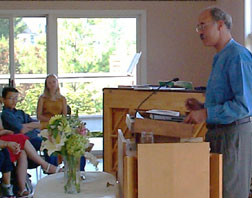UUA President comes
to the New River Valley
 |
Reverand William G. Sinkford in the pulpit at the Unitarian Universalist Fellowship of the New River Valley. July 2, 2002. |
Garrison Keillor, host of radio's "A Prairie Home Companion," tells the tale that his apocryphal hometown of Lake Wobegon was founded by Unitarian settlers. They came, so the joke goes, to practice religious freedom and teach interpretive dance to the Indians. Current readers will have a chance to learn more about the denomination that launched a thousand radio shows when the president of the Unitarian Universalist Association (UUA) speaks in Blacksburg on Sunday.
As their name implies, Unitarians reject the notion of a trinity as non-scriptural. It's a viewpoint that dates back at least to 325 A.D., when early church fathers wrangled over the matter, narrowly adopting a trinitarian stance for the emerging Catholic Church, in a contentious vote at the council of Nicea. Modern Unitarianism took root in Europe as a non-creedal faith in the Protestant tradition, a tradition it shares with Baptists, Quakers, and the United Church of Christ, among others.
Universalism, likewise, traces its origins to the first century; it is a belief in universal salvation. The 18th century men and women who founded the first Universalist churches in America did so in opposition to the Calvinist establishment. Very simply, they rejected the notion that a kind and loving God would consign any person to eternal damnation. The two liberal denominations ť Unitarians and Universalists -- merged into one in 1961, forming the UUA.
Today, there are over 1,050 UU congregations nationally, from large and venerable cathedrals descendant of the first Pilgrim churches, to small fellowships of a couple dozen members. A typical worship service will have a Protestant familiarity ť except, scripture might be from the Torah, silent meditation is as likely as prayer, and the hymns range from "A Mighty Fortress is our God" to "Blow'n in the Wind." More than half of the denomination's active ministers are women, and the church ordains gays and lesbians and performs same-sex unions.
The church's critics don't often share Keillor's gentle humor. They point out that a religion accepting of everything runs the risk of becoming a religion about nothing. Even so, the approach seems to hold appeal for a multicultural America searching for answers in a newly divided world. While mainstream denominations have been hemorrhaging members over the last two decades, UUism has made steady gains. That's especially true in the southeast, a region known for its traditional and conservative faithful.
A list of the church's illuminati includes some of our nation's most influential reformers and intellectuals: Oliver Wendell Holmes, Clara Barton, Horace Mann, Margaret Fuller, Whitney Young, Dorothea Dix, Ralph Waldo Emerson, Albert Schweitzer. Critics cite just that when calling attention to one of the church's deepest flaws. Historically, it has been a church of the educated and privileged; and, though membership is moderating as the denomination works to bring in people of color, it remains overwhelmingly white. That's what makes the new president of the UUA all the more notable.
The Rev. William G. Sinkford, 55, was born in San Francisco and grew up in Cincinnati, Ohio. He served as president of the UUA's continental youth organization in his teens. As a high school senior, he was one of the first U.S. Presidential Scholars. Sinkford graduated cum laude from Harvard in 1968 and spent the following year in Greece as a Rockefeller Fellow.
For a decade, Sinkford held management positions in marketing with Gillette, Avon Products, Johnson Products, and Revlon. During this time, he received the Black Achievers in Industry Award from the Harlem YMCA. After returning to Cincinnati, he ran his own construction and restoration business. It was there that he heard his call to ministry. Sinkford earned his divinity degree in 1995 and soon joined the staff at UUA headquarters in Boston. When he was elected president a year ago, he became the only black leader of a predominately white denomination in the country.
Sinkford speaks at 9:30 a.m., Sunday at the Unitarian Universalist Fellowship of the New River Valley, 1301 Gladewood Drive, Blacksburg. A reception to follows. Take Prices Fork Road to Glade Drive, at Hardee's. Follow Glade Drive one half mile to Lark Lane, and then to Gladewood Dr. Call 552-9716 or 552-8050 for more information.
Published in the New River Current section of the 20 July 2002 Roanoke Times. Written by Leslie Hager-Smith. Photo by Stephen Keighton.
Copyright 2002, Leslie Hager-Smith; Commercial Duplication Prohibited
 UUC Home Page
UUC Home Page
 sermons, articles,
etc.
sermons, articles,
etc.